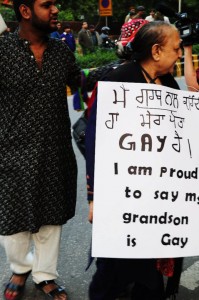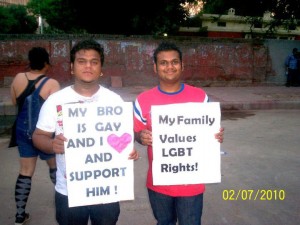It was the eve of Delhi Queer Pride parade, 2010. My home seemed like a madhouse. I live in a joint family and that night, we were double the number with my cousins, aunts and uncles who I had invited for a family dinner. I had intimated everyone well in advance and had plans to talk to them about gender and sexuality, and how these come to be experienced in a Punjabi middle class family. Most of the male relatives took a lot of time to come to terms with my sexuality. But it was worth all the effort. It has been four years since I came out to my mom. I was 17 then. The time since then has seen a series of battles with ignorance and hatred; and now, I can finally see glimmers of realization and love.
Back in 2007, when I came out to my mom, I knew that I had to exit the narrow and dark roads, and open myself to a massive exploration of my life. But having seen my heroes fight for their rights at the forefront over the years, I became determined. All those activists, writers, filmmakers, lawyers and many other everyday heroes, gave and continue to give strength and messages of hope to middle class guys like me who often come from very conservative households.
I live in Kashmeri Gate, in old Delhi, among about 20-25 other joint families that have managed to survive over the years. People tend to get deceived by the appearance of the place and think it’s a slum, when it in fact one of the more economically developed places in old Delhi. Another advantage is its proximity to the metro service, which takes me back to 29th November, 2010, the day of the Pride. My brother was away on a road trip with his girlfriend so we didn’t have our car. My mother suggested we take the metro. I looked at the painted banners and placards we were carrying for the parade, and then looked at her in open-mouthed disbelief. “So what?” she said. “They are going to stare right? Let them. For years I have seen people struggling to change our society for the better and, like you told me, this is no small cause.” Left astonished, I simply nodded and said, “Yes Mom, you’re absolutely right.”
It was a little difficult for my grandmother as she is really old, but on the eve of the parade, I remember listening to her talk to the rest of the family about the relevance of participating in the Pride parade. I can’t describe the joy I felt, at witnessing such a revolutionary and drastic change that night in my own family. It makes me think about how far we have come in these four years. Earlier, on hearing homophobic comments, I would argue for myself, but now, my family steps ahead. It is they who support me and defend my right to live the way I want to; they understand my sexuality and slowly and steadily, they are coming to terms with it. A lot was decided that night itself—who were the courageous ones, or shall I say the activist kind in my family, who would come forward and participate at the Pride event the next day. Upon which, my grandmother was disappointed to see that it was only my mom and my cousins and herself. My brother wanted to come but he couldn’t because he wanted to celebrate his girlfriend’s birthday in the hills. So, I was okay with that. Besides, I still remember that moment in 2009, when the Delhi High court had passed the landmark judgment; we had assembled at Jantar Mantar to celebrate and my brother came there and supported me.
My grandmother is an old but energetic and fierce woman. She has taught me a great deal about life. She is one of my inspirational feminist icons. At the parade, she walked all the way from Tolstoy Marg in CP to Jantar Mantar and I was so amazed to see how she single-handedly, and with great confidence, handled the reporters; she had a determined answer for every question that was thrown at her by the media persons.
‘I am proud to say my grandson is gay.’ That’s what my grandmother’s placard read. Alongside her, my mom and my cousins also held posters and banners in their hands. I felt overwhelmed; this was my fairy tale. Seeing us, the Pride organizers asked my grandmother to come to the stage and share a few words with everyone. There was so much excitement in the crowd; we were more than 3500 in number.
Everybody welcomed her on stage with the loudest applause anyone could’ve ever heard at Jantar Mantar. She spoke about the need for our society to explore and open our minds to the world that exists beyond the narrow confines of hetero-normative structures that we have framed our minds with. She often stressed on the word “Avaam ki azaadi”, “Bacho ko jeene ki azaadi” and she spoke like a radical feminist, which is frankly more than I could have dreamed for my family to become when I had started coming out to them four years ago. Every word and action expressed by my family that day filled me with a deep sense of satisfaction. I faced my own conscience with a brave voice; I am 21 and suddenly growing up also meant becoming important, almost a hero in the drama of one’s life. Thanks to last year’s Pride, I am convinced that the Pride parade is not just for people with alternative sexuality. It is a celebration for everyone. When I asked my mom and grandmother about their experience, they said boldly that it was the first time in their lives that they felt proud of being women; not as women who were marginalized in society, but as those who understand that the shallow hetero-normative norms couldn’t do good for anyone, especially for their kids who identify themselves as LGBTQI.
On that account, I believe that every household must come forward and march with their kids at the Pride parade so that they can give hope to others. Just like my family did last year. I too, tell everybody how I went through the same experience as many, who have to deal with the initial sense of denial by their families, the disappointments and all the sadness that accompanies the struggle to convince them about one’s natural way of expressing sexuality.
I want to live in a society that thinks beyond patriarchy and hetero-normativity; where parents support their kids about the freedom to express their sexuality. For years, we have been hindered by our own laws, myths and stereotypes. It is high time for everybody to end the discrimination and violence, and reclaim our freedom to live and think as we want. It has been interesting to see how the struggles and campaigning around gender and sexuality that have emerged in this last decade in our country, are not just about queer people. They have included everybody because it is a bigger question of freedom—the right to Liberty as has been guaranteed in our Constitution.
- Submissions Open for Rainbow Awards for Literature & Journalism 2025 - June 6, 2025
- Daniel Craig’s “Queer” and Elliot Page’s “Close To You” to bookend Mumbai’s iconic LGBTQ+ film festival KASHISH 2025 - May 25, 2025
- Film Kuch Sapney Apne Celebrates Diversity and Family Acceptance, and Stars Parents and LGBTQ+ Members in Cast - February 25, 2025



